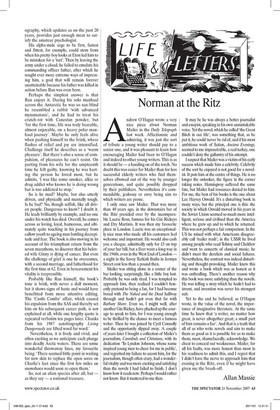Norman at the Ritz
Andrew O'Hagan wrote a very nice piece about Norman Mailer in the Daily Telegraph last week. Affectionate and admiring, it was just the sort of tribute a young writer should pay to a senior one, and it was pleasant to learn how encouraging Mailer had been to O'Hagan and indeed to other young writers. This is as it should be — a handing on of the torch. No doubt this was easier for Mailer than for less successful elderly writers who find themselves elbowed out of the way by younger generations, and quite possibly dropped by their publishers. Nevertheless it's commendable, jealousy or envy being sins to which writers are prone.
I only once saw Mailer. That was more than 40 years ago, in the downstairs bar of the Ritz presided over by the incomparable Laurie Ross, famous for his Gin Rickeys and Dry Martinis. It was then my favourite place in London. Laurie was an exceptionally nice man who made all his customers feel welcome and important. He would also cash you a cheque, admittedly only for £5 on top of your bar bill, but a fiver went a long way in the 1960s, even in the West End of London — a night in the Savoy Turkish Baths in Jermyn Street cost less than a pound then.
Mailer was sitting alone in a comer of the bar looking, surprisingly, like a little boy lost. Probably he was only tired. I was tempted to approach him, then realised I couldn't honestly pretend to being a fan, for I had become bored with The Naked and the Dead halfway through and hadn't got even that far with Barbaty Shore. Even so, I might well, after another Gin Rickey, have plucked up the courage to speak to him, for I was young enough to be thrilled by the chance to meet a famous writer. Then he was joined by Cyril Connolly and the opportunity slipped away. A couple of years later I bought a collection of Mailer's journalism, Cannibals and Christians, with its dedication 'To Lyndon Johnson, whose name inspired young men to cheer for me in public', and regretted my failure to accost him, for the journalism, though often crazy, had a wonderful vitality and was more exciting and satisfying than the novels I had failed to finish. I don't know how it reads now. Perhaps I would rather not know. But it mattered to me then.
It may be he was always a better journalist and essayist, speaking in his own unmistakable voice. Yet the novel, which he called `the Great Bitch in our life', was something that, as he put it, he could 'never be rid of, and if his most ambitious work of fiction, Ancient Evenings, seemed to me impenetrable, a real turkey, one couldn't deny the gallantry of his attempt.
I suspect that Mailer was a victim of his early success which made him a celebrity. Celebrity of the sort he enjoyed is not good for a novelist. It puts him at the centre of things He is no longer the onlooker, the figure in the corner taking notes. Hemingway suffered the same fate, but Mailer had resources denied to him For me, the best of his books is the one about Lee Harvey Oswald. It's a disturbing book in many ways, but the principal one is this: the society in which Oswald moved in his years in the Soviet Union seemed so much more intelligent, serious and civilised than the America where he grew up and to which he returned. This was not perhaps a fair comparison. In the US he mixed with what Americans disagreeably call 'trailer trash'; in the USSR he lived among people who read Tolstoy and Chekhov and went to concerts of classical music; he didn't meet the derelicts and social failures. Nevertheless, the contrast was indeed disturbing and thought-provoking. Mailer knew this and wrote a book which was as honest as it was enthralling. There's another reason why this book was more satisfying than the novels. He was telling a story which he hadn't had to invent, and invention was never his strongest suit.
Yet to the end he believed, as O'Hagan wrote, in the value of the novel, the importance of imaginative literature. At the same time he knew that 'a writer, no matter how great, is never altogether great; a small part of him remains a liar'. And that is a truth that all of us who write novels and aim to make them as good as it is possible for us to make them, must, shamefacedly, acknowledge. We cheat to conceal out weaknesses. Mailer, for all his faults, was more honest than most in his readiness to admit this, and I regret that I didn't have the nerve to approach him that evening in the Ritz, even if he might have given me the brush-off.
Allan Massie






































































 Previous page
Previous page